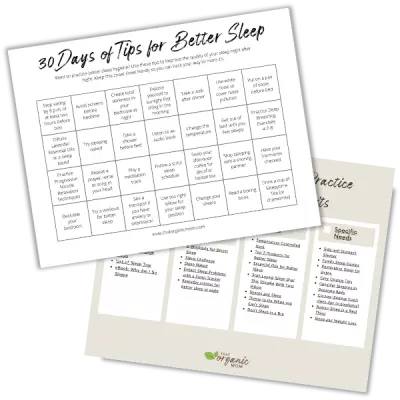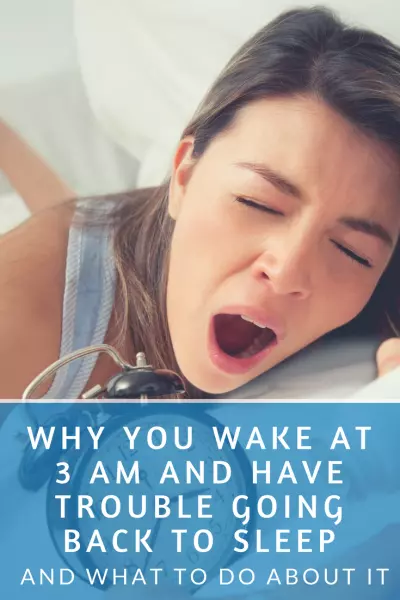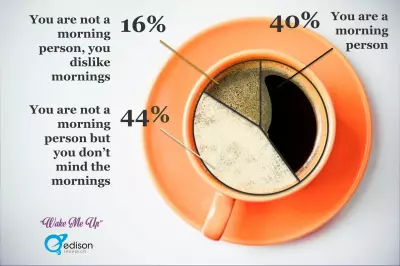Last Updated on June 29, 2022 by Rebecca Huff
As long as I can remember I have been an early riser. Being a person who wakes at the crack of dawn is great if you are in the military. Waking early is useful if you are a tv or radio morning show host, a barista, a baker or a farmer. For Americans, the “peak time” for waking is between 6 and 6:30 a.m. Only 8% of Americans wake up at 5 a.m. and only 1 in 5 get up at 5:30 a.m., with a quarter of the population waking between 6:30 and 7 a.m. (source)
Most people think of insomnia as the inability to fall asleep. However, there are several different types of insomnia and other sleep disorders. One of those is sleep maintenance insomnia, interruption insomnia or simply difficulty staying asleep.
You're wide awake and fully alert, the problem is it's 3 a.m., and you don't need to be up until six o'clock. You close your eyes to try to drift off, but you keep thinking about your to-do list, grocery list, work project, or upcoming vacation packing. In an attempt to get sleepy again, you count sheep, recite Bible verses, pray, but you are still wide awake.
Sound familiar? If you regularly wake between 3 and 5 a.m. and have trouble falling back asleep, wake suddenly and can't fall back asleep, or feel you are half awake during sleep you could be dealing with sleep maintenance insomnia. For those who have trouble falling asleep, or experiencing wakefulness even when they need to sleep, the term is sleep-onset insomnia. Both can leave you feeling miserable the next day.
The prevalence of insomnia in America is between 30-40% of the population.
Other than diseases and disorders, such as restless legs syndrome, or obstructive sleep apnea; there are multiple reasons for sleep maintenance insomnia:
- depression often disrupts the ability to reach the deeper phases of sleep
- Anxiety and panic disorders
- Chronic pain in particular arthritis, asthma, apnea, or restless leg syndrome
- digestive issues such as stomach acid imbalance, etc.
- coffee too late in the day
- alcohol before bed
- liquids too close to bedtime
- low blood sugar levels
- hormone fluctuations (premenopause, menopause)
- went to bed too early
- a partner who snores, tosses and turns, etc. (sleeping alone can improve your relationship)
- you are in or entering middle age
- sounds (dogs barking, electronics, etc.)
- the temperature in sleep environment is too warm
Some of these can be corrected with simple behavior modification while others may be harder to figure out. It can help to journal changes you make in your daily routine to see what works.
Sleep Maintenance Insomnia Recommendations
Try these suggestions:
- Work out at a different time of day, if you normally workout in the mornings, try switching your workout to after work, or vice versa if you've been working out at night.
- Stop looking at the clock, worrying about falling asleep can keep you awake.
- Keep a sleep log (sleep journal, sleep diary)
- Use relaxation techniques to get back to sleep
- Cognitive behavioral therapy – changing the way you think about sleep
- Make sure your mattress has adequate support, is comfortable, and does not need to be replaced
- Use on the right pillow for your sleep position
- Try reading a novel or magazine something to get you sleepy but do not look at your phone or another electronic device which could make you feel more awake.
- Melatonin helps some people correct their circadian rhythm. Melatonin shifts the circadian rhythm and promotes sleep onset and continuity, allowing you to stay asleep.
Sometimes as we get older sleep patterns change. Knowing that this is a normal part of life can help you worry less and get more sleep. It might be helpful to make some adjustments to our sleep routines as we grow older. Many older adults start sleeping less or waking in the early morning.
In early adulthood the amount of slow-wave sleep begins to decline. Elderly adults typically have relatively short periods of slow-wave sleep and fewer of them. In other words, sleep is lighter and more fragmented with brief arousals or longer awakenings throughout the night. (1)
Maybe you are worrying unnecessarily, you might already be getting the amount of sleep your body needs. Adults over sixty-five may need less sleep than younger adults. Take into consideration how you feel, your health, and energy levels.
Catching up on Missed Sleep
Unless you nap early enough, “catching up” during the day can cause more sleep problems, so proceed with caution. Try to time the nap just before you normally start to feel drowsy. For example, I often would start to feel like I needed sleep around 2 p.m., not surprising since I was waking up around 3 or 4 a.m. daily. Not being one to take naps, I usually would fight the sleepiness. As an experiment, I tried napping at 1:30, just before my drowsy time usually started, I set my timer to wake me after thirty minutes and felt refreshed.
As a result, I was able to stay awake longer at night and sleep a bit later the following morning. So while a long afternoon nap might hurt your sleep later, a well-timed, brief nap can be beneficial.
In many cultures, particularly those with roots in tropical regions, afternoon napping is commonplace and is built into daily routines. And although the exact timing of naps is not officially scheduled, it is not uncommon for stores and government offices to close and for many activities to stop for an hour or two every afternoon.
…
Afternoon naps for most people typically last between 30 and 60 minutes. Any longer and there is a risk of falling into deep sleep and having a difficult time waking. Following a nap, having dissipated some of the accumulated sleep drive, many people report feeling better able to stay awake and alert in the late afternoon and evening. This increased alertness typically causes people to go to bed later and generally to sleep less at night than people who do not take naps.According to sleep experts, napping can be a good way for people who do not sleep well at night to catch up. They do caution, however, that people with insomnia may make their nighttime sleep problem worse by sleeping during the day. Otherwise, they generally recommend naps for people who feel they benefit from them. (2)
Adapting Your Sleep Habits
Before you turn to sleep aids, try to determine if what you're experiencing is short-term insomnia. Try following tips for good sleep hygiene, including getting up and going to bed at the same time every single day, including weekends. Monitor your bedroom and environment for sleep disturbances, such as pets, traffic, etc.
Cut back on caffeine and other stimulants after lunch and also consider spending time outside during the afternoon.
Personally, I don't mind waking up hours before my family because it means I have uninterrupted work time for projects, writing, or studying. Surprisingly according to Edison research national online survey, only 16% of Americans say they hate mornings. Another surprising fact, about half of those surveyed use an alarm clock to get up, while just over a third of us wake naturally.
As long as I get about eight hours of sleep, I don't mind waking up before 5 a.m. If you don't typically plan activities late at night, you could simply move your bedtime up an hour or so. For example, if you normally wake at 4 a.m. try going to bed at 8 p.m. to get your full eight hours of sleep.
Slowly make adjustments to your sleep schedule until you are getting better sleep quality on a regular basis.
If you would rather sleep more in the morning and less in the evening, another option is timed light therapy.
bright light therapy administered in the evening. Exposure to bright light in the evening temporarily inhibits the release of melatonin, a hormone related to sleepiness. Once bright light exposure is ceased, melatonin is released and sleepiness is fostered. (3)
For example try using a light box for 30 minutes after dinner, then move the time 15 minutes later each week while simultaneously shifting bedtime and wake time by 15 minutes until you reach your desired sleep window.
Sleep maintenance insomnia can be a troubling problem, but it is one that can be corrected with effort. Using a Sleep Cycle App and/or a sleep journal can help you identify patterns that can be adjusted for better quality sleep.
If you try these tips and find you are still waking in the middle of the night, consider making an appointment with a sleep specialist. You may want to have a sleep study done to rule out possible medical conditions. Is it possible you may have sleep apnea. Chronic insomnia is no laughing matter and it can certainly take a toll on your mental health. Poor sleep leads to daytime sleepiness and can eventually lead to impairment. According to the American Academy of Sleep Medicine, sleep deprivation can be as dangerous as driving drunk.
A sleep specialist can give you the best choices concerning the treatment of insomnia if it persists. Many treatment options exist, so if the idea of taking a pill doesn't sit right with you, there are other therapies for resolving insomnia.
Read more about sleep hygiene, kids sleep hygiene and sleep hygiene for teens PLUS lots of other sleep issues on this site.
Download the 30 Days of Tips for Better Sleep

What sleep issues do you struggle with? We'd love to help! Feel free to contact us or simply comment below. Sleep well; sweet dreams!


Sources:
- http://healthysleep.med.harvard.edu/healthy/science/variations/changes-in-sleep-with-age
- http://healthysleep.med.harvard.edu/healthy/science/what/sleep-patterns-rem-nrem – Natural Patterns of Sleep | Healthy Sleep, February 11, 2018
- https://www.ncbi.nlm.nih.gov/pmc/articles/PMC3377480/
- https://www.ncbi.nlm.nih.gov/pmc/articles/PMC3377480/#R6
- https://sleepfoundation.org/sleep-tools-tips/healthy-sleep-tips



 Why you need to use a toner and how to choose the best one
Why you need to use a toner and how to choose the best one
Leave a Reply
You must be logged in to post a comment.